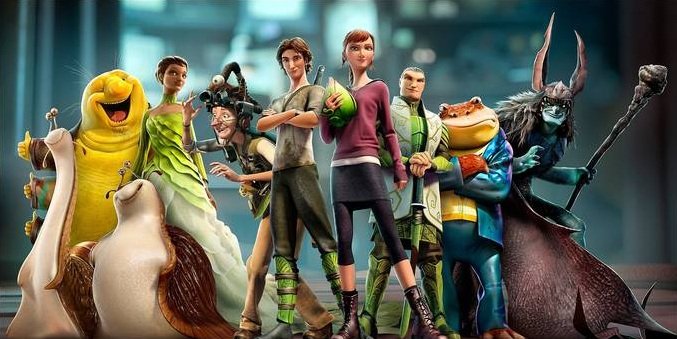What's down that rabbit hole or in that wardrobe? ‘Epic’ follows tradition of children’s fictions bridging earthly, fantasy realms
 What's down that rabbit hole or in that wardrobe?: ‘Epic’ follows tradition of children’s fictions bridging earthly, fantasy realms
What's down that rabbit hole or in that wardrobe?: ‘Epic’ follows tradition of children’s fictions bridging earthly, fantasy realms
In the just-opened animated adventure film, “Epic,” a teenage girl named Mary Katherine (voiced by Amanda Seyfried) has effectively been abandoned. She arrives in the country to reconnect with her harebrained dad (Jason Sudeikis), a nerdy scientist obsessed with finding a woodland kingdom of miniature creatures. Grieving the loss of her mother, Mary Katherine, or “M.K.,” needs her father more than ever. But her dad’s belief in a secret world makes him all the more distant. “I’ll be right here,” M.K. huffs. “In reality.”
Naturally, M.K.’s ideas about magical realms are about to change. Stumbling into the woods, she snatches what looks like a glimmering leaf as it drifts down from the trees. The “pod” glows brighter in her hands, and then, KA-POW! our heroine is transported (and shrunk) to the hidden land of the Leafmen. There, she finds her purpose among a race of tiny people who, armed with bows and swords and mounted on sparrows and hummingbirds, protect the forest from the baddies in, yes, an ongoing battle between the forces of good and evil.
Movies about worlds disconnected from our own are commonplace. Think of the many science fiction and fantasy narratives that lie along the “Star Wars” to “The Lord of the Rings” continuum. These separate realities are filled with orcs and wizards, siths and spaceships. Humans may live there, but we Earthlings can’t visit them. No magic door leads from Boston to Tatooine, no trip down a rabbit hole or along the Red Line arrives in Middle-earth.
“Epic” belongs to a different but equally longstanding tradition of fiction that bridges our world to other realms. Via some gateway, a journey is made to a kind of Neverland or Narnia. The trope is as old and dark as the burrow in “Alice in Wonderland” and Dorothy’s twister in “The Wizard of Oz.” You can follow these tunnels from “Labyrinth” to “Pan’s Labyrinth,” through “Harry Potter” and “Percy Jackson and the Lightning Thief” and beyond to every story that maps that liminal space between us and some parallel place.
As sophisticated and tech-savvy as we’ve become in the 21st century, apparently we still need to believe in hidden worlds that coexist with the real world. In fact, we might need them more than ever. As we get more attached to our digital devices, our traditional spells don’t work anymore. Satellites have mapped every square inch of the planet; Google conjures an explanation for everything. We’re disconnected from witchcraft, nature, and the mysterious. Myth and fairy story gain no purchase on our daily lives.
Consequently, as we’ve galloped from industrialism to post-industrialism to digitalism, we’ve seen an explosion of fantasy and adventure movies in the last 30 years — from “The Goonies” (1985) to “The Golden Compass” (2007) — which reconnect us to these concealed worlds. We cling to old stories, newly enhanced by advances in special effects whose verisimilitude makes these worlds feel more convincing than ever.
Read the rest of my story at Boston Sunday Globe